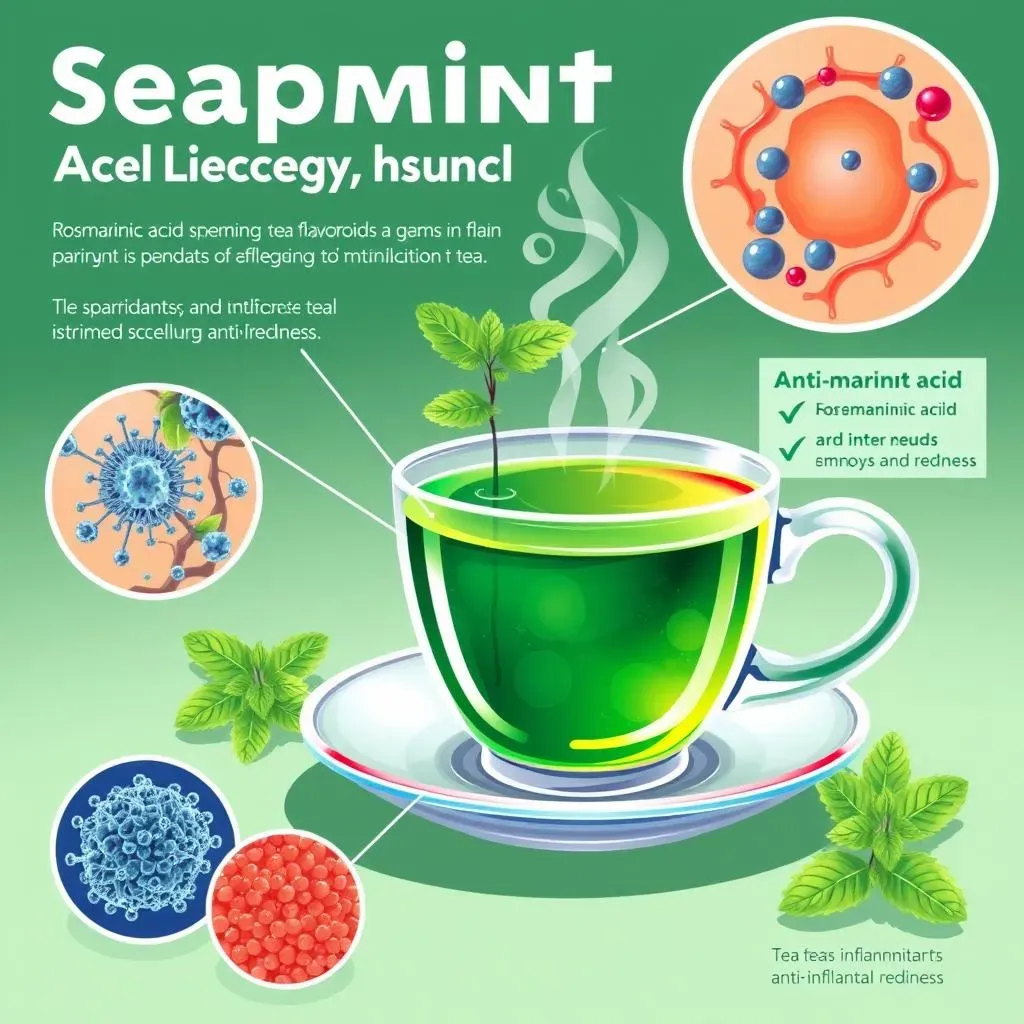Table of Contents
Ah, allergy season – that time of year when your eyes water more than a leaky faucet, your nose runs like a marathon, and sneezing becomes your new favorite sport (not!). If you’re tired of battling allergy symptoms with over-the-counter meds, you might be curious about natural remedies. Enter spearmint tea, a refreshing beverage with a potential secret weapon against those pesky allergens. This article explores the intriguing possibility of using spearmint tea for allergy relief. We'll examine the science behind its potential benefits, exploring the compounds in spearmint that might help calm allergy symptoms. We'll also cover how to brew the perfect cup of spearmint tea and discuss what to expect when you try this natural approach. Get ready to discover if this minty brew can be your new allergy-fighting ally. Prepare to learn whether spearmint tea for allergy relief is just a myth or a potential game-changer for your allergy battle. Let's dive in!
Understanding Allergies and Spearmint Tea's Potential
Understanding Allergies and Spearmint Tea's Potential
Allergies happen when your body mistakes harmless things, like pollen or pet dander, for invaders. Your immune system goes into overdrive, releasing histamine, which causes those annoying allergy symptoms: sneezing, itchy eyes, runny nose—the whole shebang. Now, spearmint tea, made from the leaves of the Mentha spicata plant, isn't a miracle cure, but some believe it might offer some relief. It contains compounds with anti-inflammatory and antioxidant properties, which could potentially help calm down an overactive immune response. Think of it like this: your immune system's a bit like a fire alarm that sometimes goes off for no reason. These properties in spearmint might act as a gentle 'shhh' to that overly enthusiastic alarm. But remember, everyone reacts differently, and what works wonders for one person might not do much for another. For more on how spearmint can help with other issues, check out our articles on spearmint tea for stress relief or spearmint tea for headaches.
Allergen | Common Symptoms |
|---|---|
Pollen | Sneezing, runny nose, itchy eyes |
Pet dander | Itchy eyes, skin rash, sneezing |
Dust mites | Runny nose, congestion, coughing |
Before we explore the science, it's important to note that while spearmint tea might offer some soothing relief from mild allergy symptoms, it’s not a replacement for doctor-recommended allergy treatments. If you have severe allergies, always consult with an allergist or your doctor. They can help you create a personalized plan that's right for you. Learn more about other benefits of spearmint tea for digestion; it might help with those allergy-related tummy troubles.
- Always consult your doctor before trying new remedies, especially if you're on other medications.
- Start with a small amount of spearmint tea to see how your body reacts.
- Don't expect miracles; spearmint tea may offer mild relief, but it's not a cure-all.
Exploring the Science Behind Spearmint Tea for Allergy Relief
Exploring the Science Behind Spearmint Tea for Allergy Relief
Anti-Inflammatory Actions
So, what's the science behind spearmint's potential allergy-fighting powers? A big part of it lies in its anti-inflammatory properties. When you have allergies, your body releases inflammatory chemicals, causing swelling and irritation. Spearmint contains compounds, like rosmarinic acid, that have shown anti-inflammatory effects in some studies. These compounds might help to tone down that inflammatory response, potentially easing allergy symptoms like swelling and itching. It’s not a magic bullet, but it could contribute to overall relief. For some extra relaxation to combat allergy stress, check out our guide on spearmint tea for stress relief.
Think of it like this: your body's inflammatory response is like a raging fire. The compounds in spearmint act like a gentle stream of water, helping to cool things down, not extinguish the entire fire completely, but reducing the intensity. It's important to remember that the research on spearmint and allergies is still ongoing, and more studies are needed to confirm these effects. However, the existing evidence suggests a potential mechanism for its soothing effects.
Compound | Potential Effect |
|---|---|
Rosmarinic acid | Anti-inflammatory |
Other flavonoids | Antioxidant, anti-inflammatory |
Antioxidant Properties
Beyond its anti-inflammatory abilities, spearmint also boasts impressive antioxidant properties. Antioxidants help protect your cells from damage caused by free radicals, unstable molecules that can contribute to inflammation and other health problems. This antioxidant activity could indirectly help manage allergy symptoms by supporting your body's natural defense mechanisms. If you're dealing with digestive issues alongside your allergies, you might find that spearmint tea aids digestion too.
The antioxidants in spearmint are like tiny bodyguards, protecting your cells from harm. By reducing oxidative stress, they might contribute to a less intense inflammatory response during an allergic reaction. Again, this is a potential benefit, not a guaranteed cure. More research is needed to fully understand the extent of spearmint's antioxidant impact on allergy symptoms. But it does add to the picture of its overall potential.
- More research is needed to fully understand how spearmint affects allergies.
- Spearmint's effects may vary from person to person.
- Always consult a doctor for severe allergies.
Brewing Up Relief: Using Spearmint Tea for Allergy Symptoms
Brewing Up Relief: Using Spearmint Tea for Allergy Symptoms
Choosing Your Spearmint
First things first: you'll need some spearmint! You can usually find dried spearmint leaves in health food stores or online. Fresh spearmint is even better if you can get your hands on it – the flavor is brighter and more potent. Look for leaves that are vibrant green and smell strongly of mint. Avoid leaves that are brown or wilted. A little goes a long way, so don't worry about buying too much. If you're dealing with stress alongside your allergies, you might find our guide on spearmint tea for stress relief helpful.
Once you have your spearmint, you're ready to brew! Remember, this is a natural remedy, so consistency is key. Don't expect an immediate, dramatic change, but rather a gentle, cumulative effect over time. It’s like training for a marathon—you don’t become a champion overnight! If you are struggling with digestive issues in addition to your allergies, you may want to check out our article on spearmint tea for digestion to see if it can help with those symptoms too.
Spearmint Type | Pros | Cons |
|---|---|---|
Dried Leaves | Easy to store, readily available | May be less potent than fresh |
Fresh Leaves | More potent flavor and aroma | Requires more preparation, shorter shelf life |
Brewing Your Perfect Cup
Brewing spearmint tea is simple. For every cup of water, use about a tablespoon of dried spearmint leaves (or a handful of fresh leaves). Bring the water to a boil, then pour it over the leaves in a mug or teapot. Let it steep for 5-10 minutes, depending on your preference—longer steeping time means a stronger flavor. If you're interested in other ways to use spearmint for health benefits, you can explore our article on spearmint tea for skin.
Once steeped, strain the leaves and enjoy! You can drink it hot or cold, adding a touch of honey or lemon if you like. Experiment with the steeping time to find your perfect strength. Some people prefer a milder taste, while others like it strong and minty. Remember, this is your journey to allergy relief, so personalize your brewing process to suit your taste. If headaches are also a problem for you during allergy season, you may find our article on spearmint tea for headaches helpful.
- Use 1 tablespoon of dried leaves or a handful of fresh leaves per cup.
- Steep for 5-10 minutes.
- Add honey or lemon to taste.
Consistency and Patience
The key to seeing potential benefits from spearmint tea for allergy relief is consistency. It's not a quick fix; think of it as a supportive measure to complement other strategies you're using to manage your allergies. Try drinking a cup or two of spearmint tea daily, especially during allergy season. This allows the beneficial compounds to build up in your system and potentially offer more noticeable relief. If you’re interested in other health benefits, you can read our post on spearmint tea for immune system support.
Remember, everyone's body is different. What works for one person might not work for another. Pay attention to how your body reacts to spearmint tea. If you experience any adverse effects, stop drinking it and consult your doctor. But if you find it soothing and helpful, continue to enjoy it as part of your overall allergy management plan. Also, consider checking out our article on spearmint tea for menstrual cramps if you experience those symptoms.
"Listen to your body. It will tell you what it needs." - Unknown
